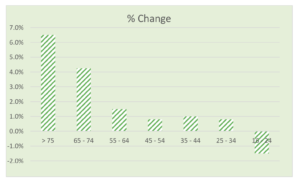The Biggest Challenge You Face
The last post we made was on December 25th, 2018. I hope each of you had a joyous holiday season and I wish you, and yours, all the best for 2019.
The Biggest Challenge you Face
I was struck recently at the population growth rates across various age demographics.
I found that data to be quite surprising. I understand what has been happening as a direct result of my situation. My grandfather who emigrated to Canada in the 1920’s was physically finished, his body was spent, in his 50s. My father was spent in his 60s. By extension then, barring disease, my body should be spent in my 70s. But the type of work we have done over these three generations has changed. It started as quite physical and has morphed gradually to be more sedentary. Rather than that decreasing our life expectancy it has increased it. I am now in my 70s and see no reason to believe that I should not be spent until at least my 80s and perhaps even my 90s.
In an article published in Scientific American in 2011 the authors Rachel Caspari and Sang-Hee Lee, noted in the “evolution of our grandparents” that mankind marked for the first time in human history that three generations might have coexisted.
This is an extremely significant change.
People are living way beyond their typical retirement age of 65 years of age. This change is putting extreme pressure on retirement incomes and medical program costs. It is also putting pressure on the leadership of organizations. At the same time the “education sector” is no longer delivering “work ready employees” as they have in the past.
The major challenge, in my view, for at least the past ten years, has been “find and retain” talented employees. I further believe that this problem is going to get much more significant.
As a result of these truths we need to look at the workforce in different ways. Let me put forward three things that I believe should be discussed, debated and addressed in the coming five years.
1. We need to engage potential workers at a much younger age, when they are in high school. We need to offer part time work that can be done after school and on Saturdays. This will perform two valuable functions. The Employers can evaluate the potential employees and the Employees can evaluate the Employers.
2. We need to become much more serious about continually upgrading the knowledge of the current workforce. Different societies and different countries have taken differing approaches over the years. I suggest for soft skill work that two weeks of learning is required each year. For work involving technology that time should increase to four weeks. For leadership there are organizations in South America that require a one-year sabbatical every five years for the executive and senior management team.
3. We need to recognize that the “older” workers need to be retained for a longer period of time. The retirement age of 65 should be changed. It should be dependent on the decisions of the Company and the Employee. As an example, I am still working today.
4. We need to explore offering part time work for differing circumstances. Europe provides a very different approach to parental leave. Both parents, father and mother have, in some cases, six months leave with their job protected upon their return. There are many job functions that could be performed for two or three days each week, or even two or four hours each day, by older workers. This work can even be done from the employee’s home.
We are all aware of our own personal biases and societal impressions of differing generations: from baby boomers to millennials. We need to stop making these generalizations and look at each of the people as individuals. We are all the same with the same needs and wants. What I see with the “younger worker” is someone who is much better educated than I was and much more technologically savvy than I was. My granddaughter, and her friends, are a good example of another item. She text communicates much more than she telephone communicates. Don’t judge whether that is right or wrong, that is a fact. That is different than my generation. My generation looks askance at that fact. WE have to get over it. She is what she is and that is how she operates. We have to adapt. There are many other similar examples.
So, I truly believe this will be your biggest change over most of your remaining life. Finding and Retaining talented people. Think it over and make some decisions. If you don’t adapt and adjust you will be left on the side of the road.
The TIME is NOW.

